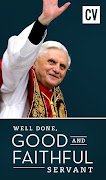 Serbian church leader breaks with past, invites pope to Belgrade
Serbian church leader breaks with past, invites pope to BelgradeReuters January 29th, 2010
Patriarch Irinej at a news conference in Belgrade, 28 Jan 2010/Ivan MIlutinovic
For all of Irinej Gavrilovic’s 80 years, his Serbian Orthodox Church has kept its distance from the Vatican and the pope, maintaining a division whose roots date back a millennium. But only a few days into the job as the 45th Serbian Orthodox Patriarch, Irinej has several times repeated an invitation to the Roman Catholic pontiff, hoping that both men could celebrate a significant anniversary in 2013.
It was an expression of hope, not only that the churches could overcome past differences, but also that two men already in their 80s could make plans three years into the future.
On Thursday, Irinej discussed the invitation in a forum that none of his recent predecessors had ever employed, the news conference, amid a give and take with a gaggle of reporters. There he said his church will be glad to welcome Pope Benedict to Serbia in 2013 in a bid to foster dialogue about reconciliation between two largest Christian communities, a millennium after their Great Schism.
The occasion would be the 1,700th anniversary of the Edict of Milan, which will be marked in Serbia’s southern city of Nis, the birthplace of the Roman Emperor Constantine. The Edict promoted religious tolerance and legalised Christianity in the Roman Empire, whose realm extended across the Balkans.
“For what we know, there’s a wish of the Roman Episcopate, the pope, that such a meeting should happen in the city which is the birthplace of an emperor who made such a landmark move,” Irinej said. Though there were no formal contacts between the Serbian Orthodox Patriarchate and the Holy See, “such a meeting would be a golden opportunity not only for an ecumenical meeting but also for the renewal of the dialogue. It would be an opportunity to open the issue of the reunification and discussion about that. It would be a long process since many centuries have passed since the split.”
The East–West Schism of 1054 split Christianity into Eastern (Greek) and Western (Latin) branches, which later became known as the Eastern Orthodox Church and the Roman Catholic Church. The Eastern Church further divided into the autocephalous groups including the Russian, Greek and Serbian Orthodox Churches.
In 1965, after centuries of sometimes bitter disputes, the Pope and the Ecumenical Patriarch of Constantinople nullified the anathemas exchanged between Eastern and Western Christian leaders in 1054, but the split along doctrinal, theological, linguistic, political and geographical lines lines has never been healed.
Irinej said there had been discussions about a papal visit to the Balkans in the 1990s, shortly after the end of wars that tore apart Yugoslavia. “Back then, we as the Holy Assembly and as the Holy Synod, believed that it was not the right time, and that the visit should be postponed for more peaceful times,” he said.
Belgrade’s daily Blic quoted Vatican spokesman Father Frederico Lombardi as saying Irinej’s remarks demonstrated an “encouraging, open and ecumenical approach, something we received with a great joy … However, we are only at the beginning of the 2010 and the 2013 is still far. This is a positive possibility, but we still don’t have enough elements to foresee the exact date of the meeting.”
Irinej’s remarks about papal visit came weeks after Serbian President Boris Tadic visited the Vatican in late 2009.
At his new conference, Patriarch Irinej also said that the Serbian Orthodox Church will remain open for dialogue with much smaller Macedonian Orthodox Church which unilaterally split from the Patriarchate in Belgrade in 1967. Although it is not in communion with any Orthodox Church, it enjoys support from the government in Skopje. “Our door will remain open to the dialogue until the issue of the unrecognized Macedonian church is resolved in the best possible way,” he said.
Although he reached out to other Christians, the new patriach upset Serbia’s Islamic community. In an interview carried by Blic, Irinej said that “Islam’s philosophy was that Muslims, when they are in small numbers, can behave well and be fair, but that once they become superior, they start to exert pressure.”
The remarks, which echoed the church’s hardline practices during the Balkan wars of the 1990s when top Serbian clergy openly backed paramilitaries who committed war crimes throughout the former Yugoslavia, sparked outrage among Serbian Islamic communities.
“It is completely clear that this statement calls for genocide, because it shows that Muslims are acceptable to the patriarch only when they are in minority and when they live with their heads bowed down,” the Islamic Community in Serbia said in a statement.
Irinej sought to rectify the problem and at the press conference he said that his church has always respected Muslim community. “It is their religion and why would we interfere and give our opinion? We respect them as a religious community. That’s what we have always been doing. We will continue to do so onwards, to be fully tolerant toward every religion, religious community and ideology,” he said.




No comments:
Post a Comment